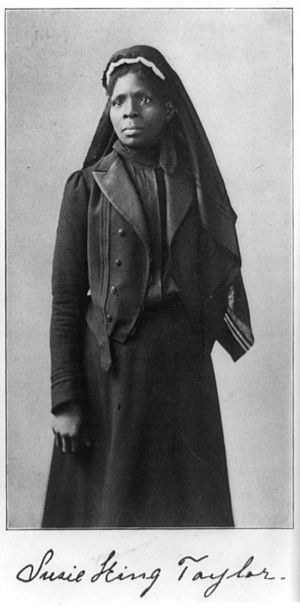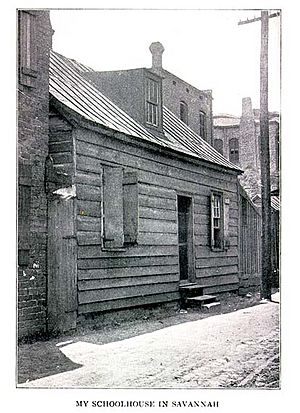Susie King Taylor facts for kids
Susie King Taylor (born August 6, 1848 – died October 6, 1912) was an amazing American woman. She was the first Black nurse during the American Civil War. She cared for injured soldiers in the 1st South Carolina Volunteer Infantry. Susie King Taylor was also the first Black woman to publish her own book about her life. Her book was called Reminiscences of My Life in Camp with the 33rd United States Colored Troops, Late 1st S.C. Volunteers. After the war, she became a teacher for formerly enslaved Black people in the South. She even opened several schools in Georgia. Later, she helped start the 67th group of the Women's Relief Corps in 1886.
Contents
Early Life and Family
Susie King Taylor was born Susan Ann Baker on August 6, 1848. She was the first of nine children born to Raymond and Hagar Ann Reed Baker. Susie was born into slavery on a plantation in Liberty County, Georgia. Her family was part of the Gullah people, who lived along the coasts of Georgia, South Carolina, and Florida.
When Susie was about seven years old, her grandmother, Dolly Reed, was allowed to take her to live in Savannah, Georgia. Susie moved to her grandmother's house with her younger brother and sister.
Learning to Read and Write
Susie's grandmother wanted her to get an education, even though it was against the law in Georgia for enslaved people to learn. This was called an "underground education." Susie and her brother were taught by Mrs. Woodhouse, a free Black woman who lived nearby. Students had to enter her house one at a time, hiding their books, so they wouldn't draw attention from the police. Susie went to this school with about 25 to 30 other children for two years.
After that, another free Black woman named Mrs. Mary Beasley taught Susie. Mrs. Beasley was Savannah's first Black nun. She taught Susie until May 1860, telling her grandmother that she had taught Susie everything she knew.
Dolly, Susie's grandmother, worked hard to support her granddaughter's education. Susie also became friends with a white girl named Katie O’Connor. Katie went to a local convent and secretly gave Susie lessons. This lasted for four months until Katie went into the convent for good. Finally, Susie was taught by her landlord's son, James Blouis, until he joined the Civil War.
Being able to read and write gave Susie King Taylor a lot of power. As a child, she would write special passes for Black people. These passes helped them avoid being arrested if they were out after the nine o’clock curfew.
Helping During the Civil War
A Young Teacher
When the Civil War started, Susie was sent back to her mother in the countryside. While escaping the war with her uncle's family, she met Captain Whitmore of the Union fleet. He asked if she could read and write. When she showed him she could, he asked her to write her name and where she was from.
A few days later, Commodore Goldsborough asked Susie to start a school for the children on St. Simon's Island. She agreed, as long as she had the right books. She received books from the North and began her first school.
At just thirteen years old, Susie King Taylor started the first free African-American school for children in Georgia. She also became the first African-American woman to teach in a free school in Georgia. During the day, she taught over forty children. At night, adults came to her classes to learn.
Joining the 33rd Regiment
In October 1862, Susie joined the army as a laundress with the 33rd Regiment Colored Troops. During this time, she married Edward King, who was an officer in the same regiment.
Susie and her husband, Sergeant Edward King, spent their free time teaching many Black soldiers how to read and write. Even though Susie's job title was laundress, she did much more. She packed bags and cartridge packs for soldiers going into battle. She also carried out orders for the commanders. People believed she was a very good shot with a rifle. She even helped with guard duty, showing she contributed more than just teaching and nursing.
A Dedicated Nurse
In her book, published in 1902, Susie King Taylor wrote about the difficult things she saw. She was always ready to help the wounded soldiers. She did everything she could to ease their pain and care for them while serving with the regiment.
Susie freely gave her service to the U.S. Colored Troops for four years and three months without getting any pay. In February 1862, she helped nurse a soldier in her military company.
She also helped people recover from smallpox because she had been vaccinated. While working as a nurse, she met Clara Barton, who later started the American Red Cross. Taylor visited the hospital at Camp Shaw in Beaufort, South Carolina to care for the sick and wounded.
Life After the War
After the American Civil War ended and the Reconstruction Era began, Susie and Edward King left the army. They returned to Savannah, Georgia.
Susie opened a school for African-American children, whom she called the "children of freedom." She also had a night school for adults. Edward, a skilled carpenter, struggled to find work because of strong unfairness against newly freed African Americans. In September 1866, Edward King died in an accident while working as a longshoreman. Their child was born a few months later.
Susie eventually had to close her schools. New public schools for African Americans were being set up, and she could no longer earn a living by teaching. Susie left her baby with her mother and became a house servant for a wealthy white family, Mr. and Mrs. Charles Green. In 1870, she traveled with the Greens to Boston. There, Susie won a prize for her excellent cooking at a fundraiser.
Taylor traveled to Boston again in 1874 and worked for the Thomas Smith family. After Mrs. Smith died, she worked for Mrs. Gorham Gray. Susie stayed there until she married Russell L. Taylor in 1879.
Fighting for Civil Rights
During the Reconstruction Era, Susie King Taylor became a civil rights activist. She saw a lot of unfair treatment in the South. Laws like Jim Crow and groups like the Ku Klux Klan caused fear and violence for African Americans. In her book, Taylor wrote about the constant violence against Black people and how laws in the South were unfair to anyone who was not white.
Later in her life, Taylor wanted to help Afro-Cubans after the Spanish–American War. She noticed they faced similar unfair treatment as African Americans during Reconstruction. Her experience as a teacher also made her an activist. She spoke out against groups trying to remove the history of slavery from school lessons.
Women’s Relief Corps
Susie King Taylor helped organize Corps 67 of the Women's Relief Corps in 1886. She held many roles, including guard, secretary, and treasurer. In 1893, she was elected president of Corps 67. In 1896, she helped create a list of all Union Veterans living in Massachusetts. This list helped many of her fellow soldiers. Susie King Taylor was a member of the all-Black corps in Boston, Massachusetts, called the Robert A. Bell Post.
Death and Legacy
Susie King Taylor died on October 6, 1912, at 64 years old.
She was buried in 1912 at Boston's Mount Hope Cemetery. She was buried in the same plot as her husband, Russell L. Taylor (1854–1901). In 2019, someone discovered that Susie's name was not on the headstone. In October 2021, Boston mayor Kim Janey dedicated a new memorial headstone. This new stone included Ms. Taylor's name and a picture of her. It was paid for by the Massachusetts branch of the Sons of Union Veterans of the Civil War.
Interesting Facts About Susie King Taylor
- In 2018, Taylor was added to the Georgia Women of Achievement Hall of Fame. This was for her important work in education, freedom, and helping others.
- Besides being the first Black army nurse, Taylor was also the first Black woman to teach in a school for former slaves. Between 1866 and 1868, she opened and taught at least three schools in Georgia.
- In 2015, the Susie King Taylor Community School was named in her honor in Savannah, Georgia, where she was born.
- Near the school, a historic marker for Taylor was put up in 2019 by the Georgia Historical Society. It tells about her life and work in teaching, writing, and medicine.
- The Susie King Taylor Women's Institute and Ecology Center was started in 2015 in Midway, Georgia.
Susie King Taylor Quotes
- "There are many people who do not know what some of the colored women did during the war. There were hundreds of them who assisted the Union soldiers by hiding them and helping them to escape."
- "Justice we ask,—to be citizens of these United States, where so many of our people have shed their blood with their white comrades, that the stars and stripes should never be polluted."
 | William M. Jackson |
 | Juan E. Gilbert |
 | Neil deGrasse Tyson |



